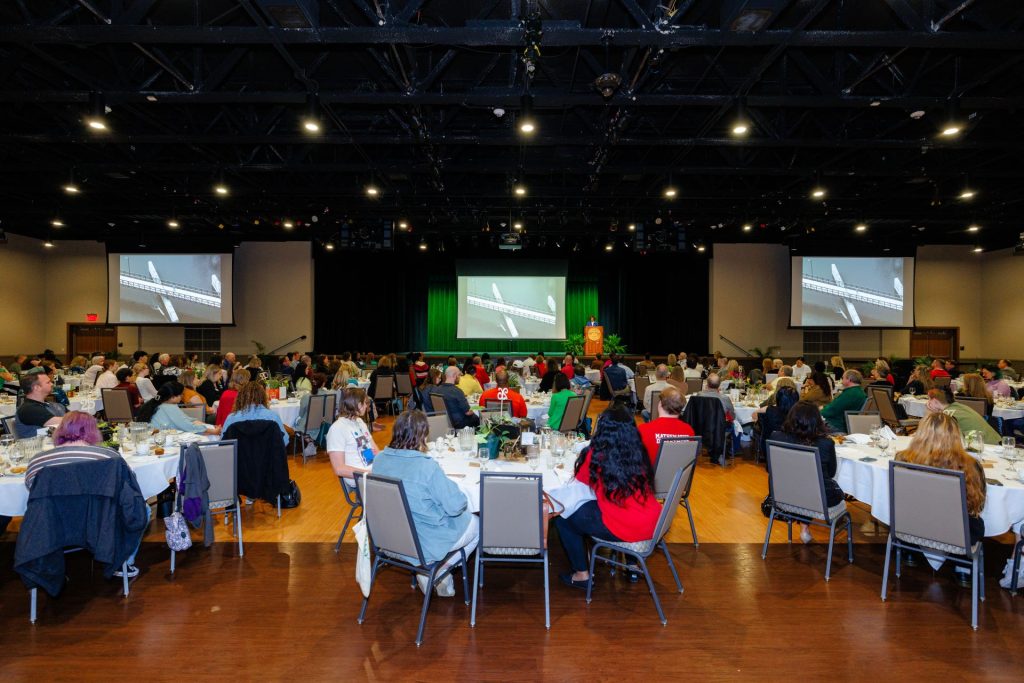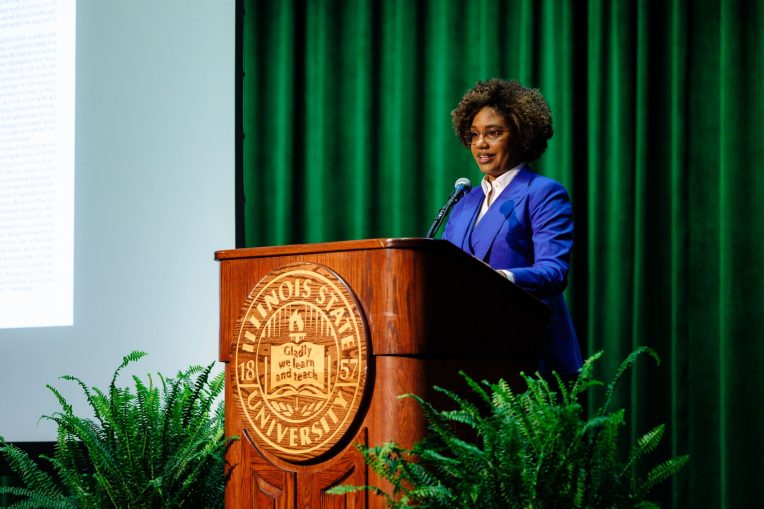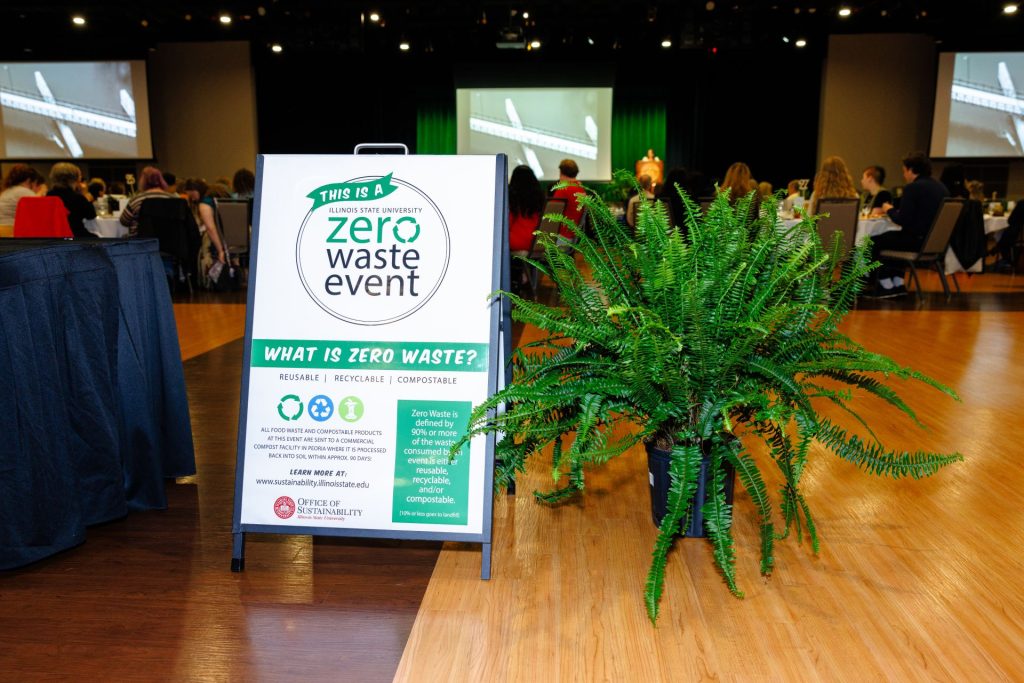LaToya Ruby Frazier, an artist-activist who uses photography, video, installation art, books, and immersive collaborations with her subjects to tell their stories of injustice, was the keynote speaker at Illinois State University’s 2024 Earth Day Breakfast, held April 18, 2024, at the Brown Ballroom in the Bone Student Center.
Illinois State’s Office of Sustainability and co-sponsors University Galleries, the Multicultural Center, Leadership Education and Development, and the Student Government Association hosted a large crowd that was served food and drink from local providers. Organic, vegan, and gluten-free items were available as was fair trade tea and coffee. Unique table centerpieces were provided by the Horticulture Center.
Jaden O’Berry, a graduate student pursuing an M.F.A. in the School of Theatre and Dance and a native of Flint, Michigan, had the honor of introducing Frazier. O’Berry spoke passionately about Flint.
“I love Flint, Michigan, with every bone in my body,” O’Berry said. “It is a city of opportunity that is growing well beyond the scope of just what is shown in the news. I implore you to continue these informed conversations. I encourage you to take action in whatever ways you see fit.
“There are real people who have been affected by this mass public health calamity. Our work is not over.”
Frazier, a MacArthur genius fellow and an award-winning photographer, chronicled the water crisis in O’Berry’s hometown in her photo essay, “Flint is Family,” which ran in Elle online and in print in the summer of 2016. Frazier arrived in Flint earlier that year, inspired by the work of the late iconic Life Magazine photographer Gordon Parks and by the people she met there, most notably Shea Cobb and her 8-year-old daughter Zion.
In 2014, the Flint City Council, in an effort to save money, switched the city’s water supply to the contaminated Flint River. Black and poor citizens were disproportionately hurt by that decision. The looming crisis smacked of racial and economic injustice.
Frazier, who had grown up near Pittsburgh when United States Steel contaminated her hometown’s air, water, and soil came to Flint to tell the story for those who couldn’t tell it themselves. In Flint’s case, the water had been polluted by General Motors.
“I had to pivot from a steel town to an automobile town,” Frazier said.
“I love Flint, Michigan, with every bone in my body … there are real people who have been affected by this mass public health calamity. Our work is not over.”
Jaden O’Berry, M.F.A. student and Flint native
She told the story through Cobb and her daughter and through Cobb’s mother Renée, but it helped that she saw herself in Zion.
“I knew when I saw Zion that she was spiritually assigned to me,” Frazier said. “Her family would make fun of how similar we looked and how much fun we had together, and we just immediately clicked. I was able to do for her what I couldn’t do for myself when I was 8 years old like she was.”
Frazier described Cobb as a single mom, a poet, a songwriter, singer, an activist, and a coach.
“To me she was like the mayor of Flint, Michigan,” she said. “She knew everyone because she was also a City of Flint school bus driver.”
Cobb and parents like her faced the fear that the lead in the water coming from the Flint River could attach itself to their children’s brains and then move into their bones.
“The American Pediatric Association came out multiple times and stressed to the government that it would prevent many from graduating from high school because it would disrupt them cognitively in such a disproportionate way,” Frazier said.
Her original five-month assignment with Hearst Corporation and Elle magazine turned into five years.

A low point for Frazier came when President Barack Obama came to Flint and appeared to take a sip of Flint’s drinking water to signal the crisis was over. Frazier maintains the president did not actually drink the water.
“As an artist I’m always fighting historical amnesia,” she said. “The moment you saw Obama do that was the moment you agreed to forget, and you forgot about the men, women, and children of Flint.
“This is where independent artists and photographers come in to play our role with these longer, sustaining documentaries where we are recontextualizing the meaning of these images.”
When negotiating her contract with Elle, Frazier took the advice of Parks’ former wife and editor, Genevieve Young. She asked for 10 pages uninterrupted with no ads. She got it.
“Typically, if it was in Life Magazine, or Vanity Fair or Vogue it would be cut with ads that seemed so tone deaf,” Frazier said. “Because it would be about affluent, rich, white people in the middle of these horrible stories, so I negotiated for them to not do that.
“It was the first time that there would be a photo essay in black and white in the September issue of Elle right before the fashion spread. So, there’s a direct through line between me and Gordon Parks.”
Frazier cautioned against making light of or dismissing situations like the one in Flint or making remarks that make people who were born and raised in Flint feel unappreciated or disrespected or not seen or not heard.
“When you see women of color telling you about environmental racism you should listen to us and not be trivializing or dismissing of what we’re saying,” she said. “It’s a hard-fought victory every day to get people in this nation to respect women of color who are at the forefront and at the intersections of all of these crises and calamities.”
Frazier told the audience that what happened in Flint is what can be done when you circumvent local governments when they don’t do right by the people.
“It shouldn’t take a Black artist like me to come in with all the hoops I jumped through to get these institutions to do right by the people who already reside there,” she said.
Frazier said she wasn’t special and that everyone can do exactly what she’s done in their own way, in their own field and in their own location.
“It’s on you and on me,” she said. “And it is possible to do these things while we are in the midst of waiting on Republicans and Democrats to do bipartisan things so we can survive.
“That is the message for today, and I hope that you’ll let it marinate and stay with you.”
A standing ovation was the audience’s reply.


